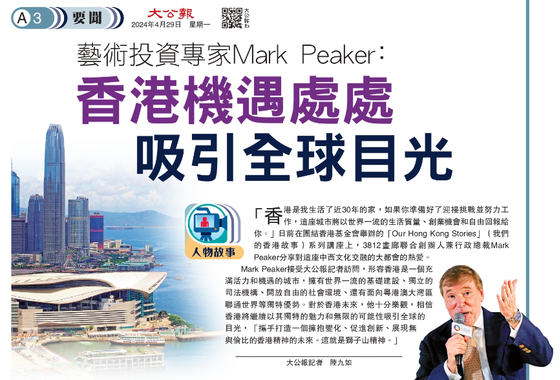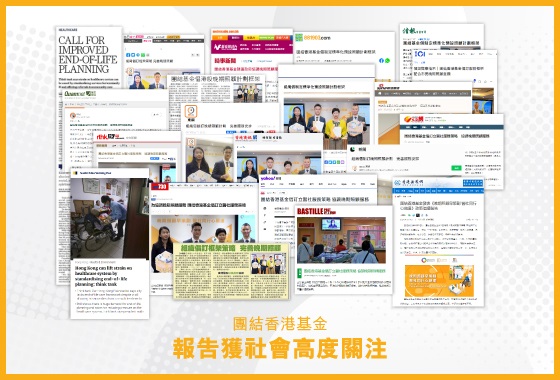It's time to embrace new internationalism
This article appeared originally in China Daily on 26 Jan, 2024.
Authors: Jane Lee, President of Our Hong Kong Foundation

Amid persistent geopolitical unrest and lingering economic repercussions from the COVID-19 pandemic, factors that have significantly affected Hong Kong, the city is embarking on a transformative journey toward economic revitalization and growth.
As part of this evolution, Hong Kong is redefining its strategic orientation and expanding its economic horizons beyond its conventional Western-centric paradigm. This shift aims to embrace a more diverse and inclusive global economic landscape and capitalize on new opportunities.
Hong Kong’s unique capabilities under “one country, two systems” have enabled the city to re-emerge in the international arena stronger than before and serve as the crucial link connecting the Chinese mainland, regional neighbors, and the broader international community.
Since the early days of British rule, Hong Kong has evolved as a multicultural melting pot linking East and West. Its economy started to diversify in the early 20th century when manufacturing began to take hold, with textiles and clothing emerging as significant industries. The city’s population surged, and with it, a boom in labor-intensive sectors such as textiles, plastics, and electronics.
Following the handover in 1997, Hong Kong quickly emerged as a center for international finance, trade, and business, becoming the vital gateway for investment into and out of the Chinese mainland.
The city has continued to thrive despite challenges arising from the Asian financial crisis, the global financial crisis, the SARS outbreak, social unrest, and, more recently, the COVID-19 pandemic.
The city’s sophisticated infrastructure, simple tax regime and the presence of numerous multinational corporations have contributed to its standing as a modern nexus for trade and finance. Hong Kong’s stock exchange is one of the world’s largest by market capitalization, and its port remains one of the busiest for container throughput. Hong Kong’s strategic location is within a five-hour flight radius of half the world’s population, covering some of the world’s most populous and economically dynamic regions.
Throughout its history, Hong Kong’s unique blend of Eastern and Western influences and its peoples’ resilience and adaptability have been instrumental in its evolution as a bustling metropolis.
Historically, “internationalization” in Hong Kong was synonymous with “Westernization”, aligning closely with Anglo-Saxon systems and benefiting from Western economic ties.
This relationship was mutually advantageous; Hong Kong was a Western-aligned entry point to the Chinese mainland’s vast market. The Chinese mainland engaged with the West through Hong Kong, fostering trade and broad collaboration across cultural, educational, and scientific domains.
Strong Western influences remain evident. The legal system is based on the principles of the common law framework inherited from British rule. It is renowned for its transparency, consistency, and adherence to the rule of law.
Hong Kong’s education sector and local universities follow British and American academic models, and over recent years, four of its universities have consistently ranked within the top 100 globally. This is a testament to the successful fusion of East and West.
However, today, Hong Kong is pivoting toward a more holistic form of internationalization, leveraging the Chinese mainland’s expanding relationships, particularly in the Global South and moving beyond the traditional “Western world”.
For example, Hong Kong is well-placed to benefit from the Belt and Road Initiative (BRI), a massive project involving more than 140 countries to improve global trade connections. With its strong background in supporting large-scale infrastructure projects, Hong Kong has the expertise and support services needed to back developments of this nature. The city’s ability to draw in substantial investments, build new partnerships, and boost regional cooperation can strengthen its position as a critical Asian economic hub.
Meanwhile, major powers like the US and the United Kingdom are distancing their economies, particularly from the Chinese mainland, citing security and trade concerns. Countries are becoming more protectionist to shield local industries, and there’s a push for technological independence rather than reliance on global networks. As a result, international bodies like the World Trade Organization and the United Nations face difficulties implementing regulations and promoting collaborative efforts.
However, the pandemic laid bare vulnerabilities in global health systems and supply chains, underscoring the urgent need for enhanced international collaboration. Cooperation is also required to combat climate change and drive sustainable trade practices in emerging markets, which are gaining influence and changing the global economic landscape.
Digitization is also revolutionizing the trade landscape by enabling more efficient, transparent, and accessible transactions across borders, thus facilitating a smoother integration of global supply chains, and opening up new markets for businesses of all sizes.
Within this context, Hong Kong’s distinct advantages make it an ideal international partner within the BRI or any other framework. The city’s financial system is characterized by the free movement of capital, underpinned by a transparent information ecosystem, contributing to its status as a global financial hub. Its tax system is not only simple but also favorable for businesses, providing a low-tax environment that is attractive to international investors.
The legal system in Hong Kong is grounded in the common law tradition. This, combined with stringent intellectual property rights protection, ensures that innovative ideas and business models are securely nurtured.
Hong Kong’s renewed internationalism doesn’t discard its Western foundations but broadens them. The city’s multifaceted ties with the West remain integral to its global identity.
Consider the longstanding peg of the Hong Kong dollar to the US dollar despite closer economic synchronicity with the Chinese mainland, which underscores Hong Kong’s enduring commitment to its role as a connector between divergent economies and its pursuit of mutually beneficial relationships on the global stage.
Hong Kong stands at a pivotal crossroads, redefining its role in an evolving global landscape. With a history steeped in the confluence of Eastern and Western influences, it now seeks a broader, more balanced international engagement. As the city leans into its strategic position within the BRI and navigates the shifting currents of global politics and economics, it does not forsake its Western ties. Instead, it integrates them into a more comprehensive, more inclusive framework.
This adaptability sets Hong Kong apart as it charts a forward-looking course. Embracing change while holding onto the essence of its past, Hong Kong is poised to maintain its legacy as a vibrant global hub, connecting diverse cultures and economies with resilience and strategic finesse.



